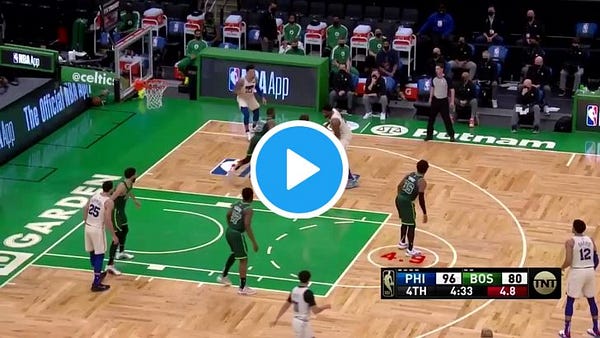Chris Paul for NBA MVP
Chris Paul’s 29-point, nine-assist and four-rebound performance to lead the Phoenix Suns over the NBA-leading Utah Jazz encapsulated the veteran guard’s entire 2020-21 season. Already established as one of the best to ever run point, Paul’s 16th season is arguably his best.
And I don’t draw the line at this being Paul’s best individual campaign perhaps ever, but the most deserving of Most Valuable Player in 2021.
Depending on how much stock one places in such things, DraftKing’s odds have Nikola Jokic and Joel Embiid leading the pack, with two-time reigning winner Giannis Antetokounmpo and (despite a lengthy absence down the stretch) LeBron James next in line.
Jokic and Embiid have earned their front-runner status, but Paul at 150-to-1 is a staggering long shot considering he’s behind Steph Curry and Luka Doncic, both of whom captain disappointing teams.
Paul’s candidacy — as much as you can call it that, given the apparent unrealistic shot he has of garnering votes — captures two themes of the award: First, there’s the omnipresent debate over what exactly the word valuable is meant to imply.
Dismissing this as mere semantics misses the mark, because there is a true difference in determining the player most valuable to their team in a given season, and the most outstanding player.
Embiid has been plenty outstanding, averaging around 30 points per game and shooting career-bests all over the floor. His offensive evolution is remarkable.
Likewise, Jokic’s all-around game might be the most entertaining in the NBA right now. Two years ago, I compared him to the legendary, almost mythical pre-injuries Arvydas Sabonis for his ability to combine traditional center prowess with a point guard’s court vision.
Jokic has only improved in the two years since, and the Nuggets are championship contenders for it — just as the Sixers are as a result of Embiid’s progress.
Both teams were expected to contend, too. That’s not a slight on either, as meeting expectations is its own unique pressure — just look at Gonzaga’s performance in the National Championship Game.
But the topic of being valuable intensifies when a player can elevate a team well above expectations. That’s what Chris Paul has done for Phoenix.
A young Suns roster going undefeated in the Orlando bubble last summer elevated the standard for an organization that, under the ownership of Robert Sarver, has been a perennial NBA bottom-feeder.
Despite its unblemished mark in the bubble, Phoenix came into Florida in too much of a hole to compete for a playoff berth. The Bubble Suns provided a fun story, but little else. How realistically could they be expected to continue that for a full(ish) season?
And indeed, preseason projections almost unanimously tabbed Phoenix for about 7 or 8 in the West; a young, fun team that would finally snap a once-proud franchise’s dubious postseason drought, but nothing more.
Instead, Phoenix holds the NBA’s second-best record, is now 2-0 against the team with the best mark, and looks like the a serious Finals challenger. Chris Paul is the piece who bridged that gap from the underdog Bubble Suns to title contenders.
Paul’s value to the Suns is evident, both in statistical production but more so, how he controls the game. And that’s not just on-court.
While his style has always been that of the quarterback — that old-school point guard who directs how the offense flows — his ability to impart his experience to young Suns like Devin Booker and Deandre Ayton functions like a coach.
The win over the Jazz again provided a snapshot. Credit the ESPN cameras for capturing Paul’s interactions with Ayton, who played one of his best games and outdueled All-Star Rudy Gobert.
Paul’s leadership, as much as his playmaking, contributed to a critical win — and his playmaking was especially on point.
This concept of Paul as an MVP candidate by virtue of him elevating teammates extends to the second theme of the award: How to evaluate point guards.
Point guards won MVP four times in the 2010s: Derrick Rose in 2011, Steph Curry in 2015 and 2016, and Russell Westbrook in 2017.
However, a point guard in the style of Chris Paul hasn’t won the honor since Steve Nash — coincidentally, another Phoenix Sun — in 2006.
Nash’s back-to-back MVPs ended a drought for the position dating back to the last of Magic Johnson’s three in 1990 (Allen Iverson won in 2001, but moved to 2-guard with Eric Snow running the point).
It wasn’t for lack of outstanding point guard play in the 15 years between Magic’s last and Nash’s first, but standouts like John Stockton in 1994, Gary Payton in 1995 and 1996 and Jason Kidd in 2002 and 2003 were all up against players at other positions who were more spectacular or outstanding.
Chris Paul has run up against it before. In New Orleans in 2008, he averaged 21.1 points, 11.6 assists and 2.7 steals per game







